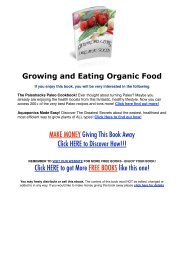Create successful ePaper yourself
Turn your PDF publications into a flip-book with our unique Google optimized e-Paper software.
!<br />
Chapter 1: <br />
!<br />
Organic Foods Basics <br />
Organic Foods Defined <br />
Organic refers to the process on how products are<br />
produced and grown. Particular requirements should be<br />
maintained and met so that products will be labeled as<br />
organic. The organic crops should be grown in safe soil.<br />
They should have no modifications and should remain<br />
separate from the conventional products. When it comes<br />
to producing organic foods, farmers are forbidden to use<br />
bioengineered genes or GMOs, synthetic pesticides,<br />
sewage fertilizers, and petroleum-based fertilizers. In<br />
terms of organic livestock, this should have access to<br />
outdoors and must be given organic feed. They will not<br />
be given growth hormones, antibiotics or any byproducts.<br />
<br />
What are GMOs or Genetically Modified Organisms? <br />
GMOs or GE foods are animals or plants in which their<br />
DNA has been changed. Such products have undergone<br />
tests to know their effects on the environment and<br />
humans. In several countries, organic products don’t<br />
intentionally contain GMOs. <br />
The Perks of Organic Foods <br />
Organic foods offer a wide range of benefits. Several<br />
studies show that the organic foods have more beneficial<br />
nutrients than the conventionally grown foods.
















